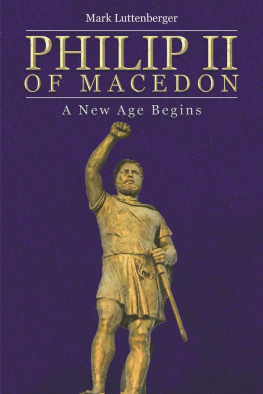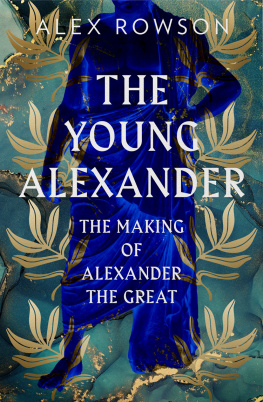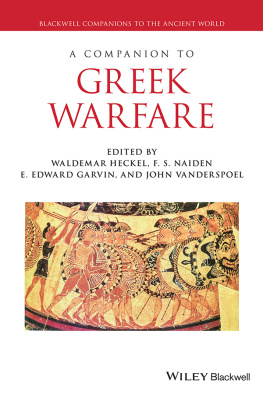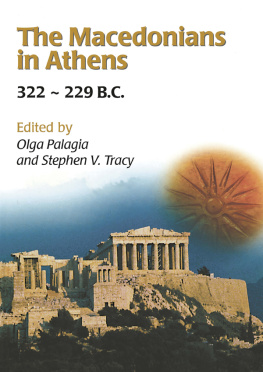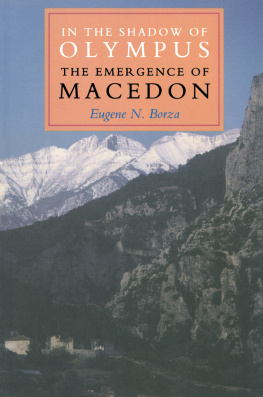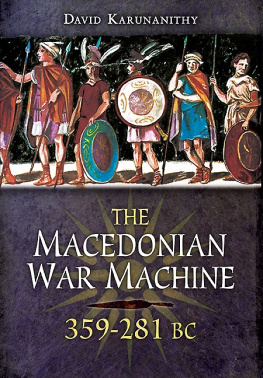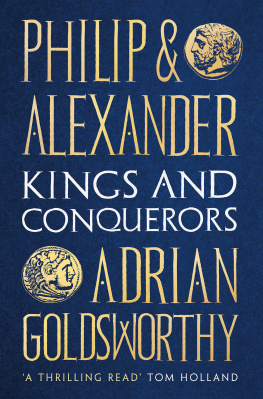Philip II of Macedon
A New Age Begins
Mark Luttenberger
Copyright 2019 Mark Luttenberger
All rights reserved
First Edition
PAGE PUBLISHING, INC.
New York, NY
First originally published by Page Publishing, Inc. 2019
ISBN 978-1-64584-234-7 (Paperback)
ISBN 978-1-64584-236-1 (Hardcover)
ISBN 978-1-64584-235-4 (Digital)
Printed in the United States of America
Table of Contents
To Dan Sommerfeldt for fifty years of friendship
Preface and Acknowledgments
Preface
The purpose of this book is to tell the story of the rise of Macedon to preeminence in the Greek world in the fourth century BC under Philip II. Although the emphasis is on the achievements of Philip II, it is not a biography of Philip. Unfortunately, there is little information about the personal life of Philip. Much that we will say about his personal relations is speculative or inferential at best. This story is about his public actions that brought Macedonian hegemony to the Hellenic world. Written in a narrative format, the emphasis is on the political, military, and economic development of the kingdom of Macedon. This book is written for those students of history who are fascinated by the Classical Age of Hellas (479323 BC) in Western civilization. Philip II (360/359336) ended the political independence of the major Greek mainland poleis of the classical period. Overshadowed by the conquest of the Persian Empire by his son Alexander III (the Great), we must remember that Philip II laid the foundation for Alexanders success.
Utilizing the literary sources from antiquity, the discoveries of archaeology, and modern scholarship, we will critique the Macedonian kingdom of Philip II. There is no dispute that there is a basic understanding of Philip IIs reign. We know the fundamental events and actions of his rule. The difficulty arises in providing explanations of these events. We can usually determine what and when occurred, but the how and why questions are more difficult to answer. This narrative is not intended to offer a revolutionary viewpoint based on new evidence or a historical thesis. However, it is designed to show that we still have more questions than answers for many aspects of Philips reign. We will provide answers to many questions but must acknowledge that the answers are certainly not definitive. Unless new evidence is unearthed from archaeology, our knowledge of this period will likely always remain incomplete. With this understanding, let us proceed to tell the story of the reign of Philip II and the Macedonian people
Acknowledgments
While writing this book, I would like to thank those who either provided encouragement or read either parts or the entire draft and provided a critique of the contents, prose, and structural layout. Dan Sommerfeldt has taken the time to provide valuable input on the economic aspects of the book. He has also provided feedback to improve the stylistic aspects of the book. My thanks to Chris and Heidi Klebs as well as Sean and Amanda Riesenberg, who read parts to improve the literary style. I must acknowledge my five grandchildrenJoseph, Brooke, Stephen, Autumn, and Joshuawho lovingly tease their Pop for his love of reading, writing, and research. They inform me that they have a life and are too busy to learn about ancient history.
A special thanks belongs to my wife, Gail. She has supported my passion for antiquity for forty-plus years. Her companionship, enthusiasm, and encouragement as we explored many ancient sites throughout Greece and Italy made these visits most memorable and filled with laughter. She is the photographer whose pictures are illustrated in the book.
A final thanks to the staff of Page Publishing for their contribution to the books editorial improvements, page design, and cover design. Their contributions greatly improved the aesthetic design of the book. I would like to especially acknowledge Olivia Marr, my publication coordinator, for her generous guidance through the books publication process.
Introduction
It has been almost twenty-five hundred years since Philip II viewed the plains, river valleys, mountains, cities, and inhabitants of his beloved Macedonia. What interest does a citizen of the twenty-first century AD have in an ancient Macedonian king? For most people, the answer is none. Knowledge of Philip II and ancient Macedonia will neither put food on the table, a roof over ones head, nor clothes on ones back. However, for many people the pursuit of knowledge, whatever the topic, provides a measure of happiness and self-satisfaction. The pursuit of truth is satisfaction enough. The study of history is no exception. The lives of the great men, women, and their civilizations provide a fascination and wonderment with their accomplishments. Each period of human existence is contingent on the actions of our ancestors. These ancestors created the world we are born into. An understanding of the past, in all its various facets, aids our understanding of the present. The study of history will not allow us to predict the future. However, knowledge of the past may guide the human species to avoid many mistakes of the past. History is not a dead subject of inquiry. It is a living testimony that can help explain to new generations the world they inhabit. The geographical, political, cultural, ideological, socioeconomic, and military structure of the present world is the product of the ideas and actions of our forefathers and foremothers.
Consequently, each generation of historians continues to explore the past to reveal the world as the inhabitants of the time, culture, and region understood it. Like a science fiction writer describing a world in the cosmos, the world of the past often seems strange and remote to us. Yet like science fiction, people like to explore history because of the strangeness and fascination it presents to modern readers. The legend of Alexander the Great has made the historical man a mythical figure. Books too numerous to count have explored the life of Alexander. In contrast, the life of his father is usually mentioned as an afterthought. Alexanders conquests altered the map of the ancient world forever. The Hellenistic and Roman civilizations that followed the demise of the classical period of Hellas were the end product of the accomplishments of Philip II and his son Alexander III. Philip put the Classical Age of Hellas on life support before Alexander pulled the plug. Philip laid the foundation for the sons success. The world at Alexanders death was very different from the world that he was born into.
The legend and deification of Alexander the Great has certainly overshadowed the phoenix that was the human Philip II. However, the son was a product of his father Philip and mother Olympias. In an order of priority of responsibilities, Philip II was king first, father second, and probably husband third. Olympias was mother first and wife second. Although her status and role as royal wife is uncertain, she had a close bond with her son. The strong-willed and fiery personalities of his parents were imparted to Alexander. Philip transformed Macedon into a political, economic, and military superpower. That superpower provided the resources Alexander used to accomplish deeds viewed as superhuman by his conquered subjects. His destruction of the Persian Empire altered the course of history and engraved his name in history as one of the great conquerors. Consequently, an exploration of Philip II and the rise of Macedon in the mid-fourth century BC is important for those who wish to understand the later Greco-Roman world and its influence on Western civilization.
Scope and Premise
The scope of this book concentrates on the political, military, and economic development of Macedon/Macedonia during the reign of Philip II in the mid-fourth century BC. Although the terms are often used interchangeably, for purposes of clarity, the term Macedon is defined as the political state of the kingdom while Macedonia refers to the central geographical territory occupied by Lower and Upper Macedonia. Ancient Macedonia is not identical with the region called the Republic of Macedonia in the twenty-first century. This state was created in 1991 from the remnants of the former Yugoslavia. In antiquity, much of this area was identified as Upper Macedonia. Much of Philips Macedonia, the area primarily identified as Lower Macedonia in antiquity, is incorporated within the borders of modern Greece. However, during the archaic and classical periods of ancient Greece, the kingdom of Macedonia was a separate entity from the Hellenic poleis (city-states) that bordered Macedonia to the south and east. By definition in this book, ancient Macedonia is the territory north of Mt. Olympus while Hellas is the region to the south.

